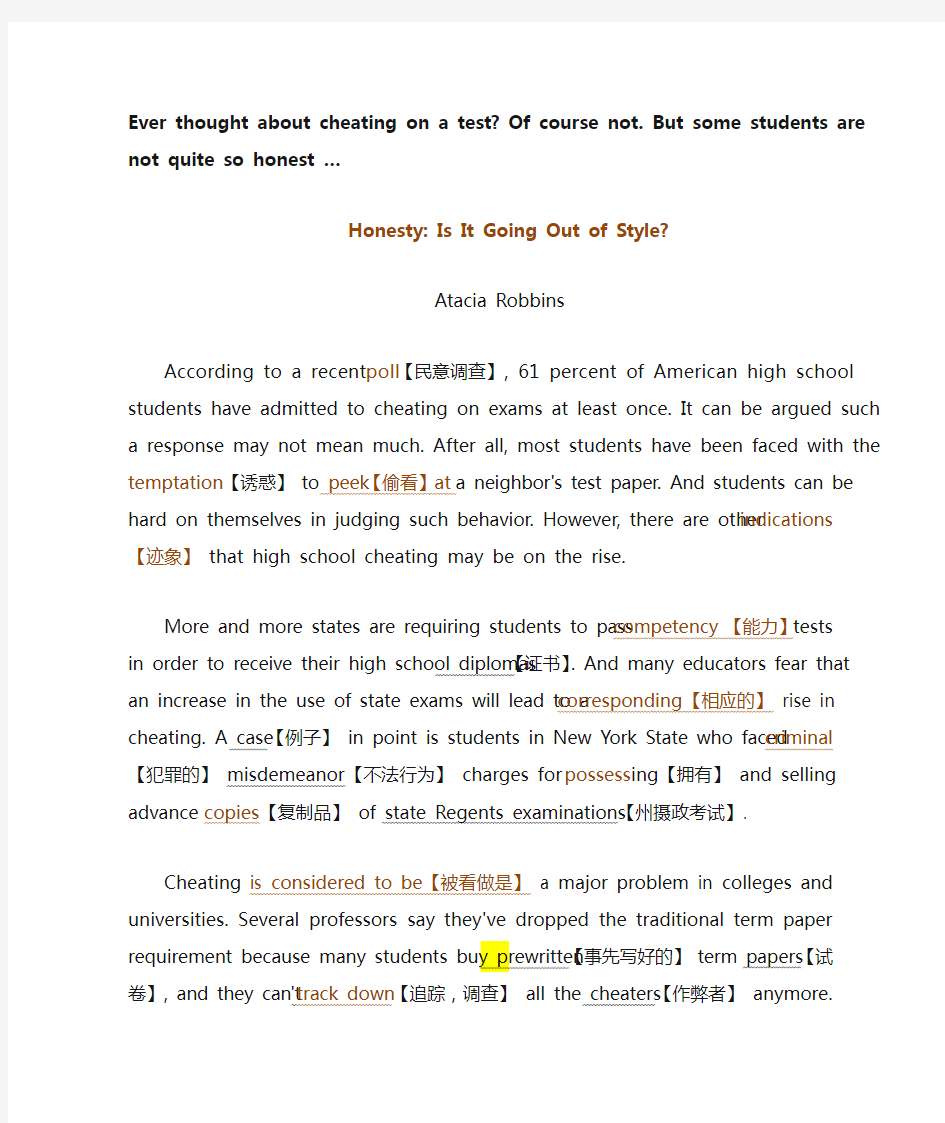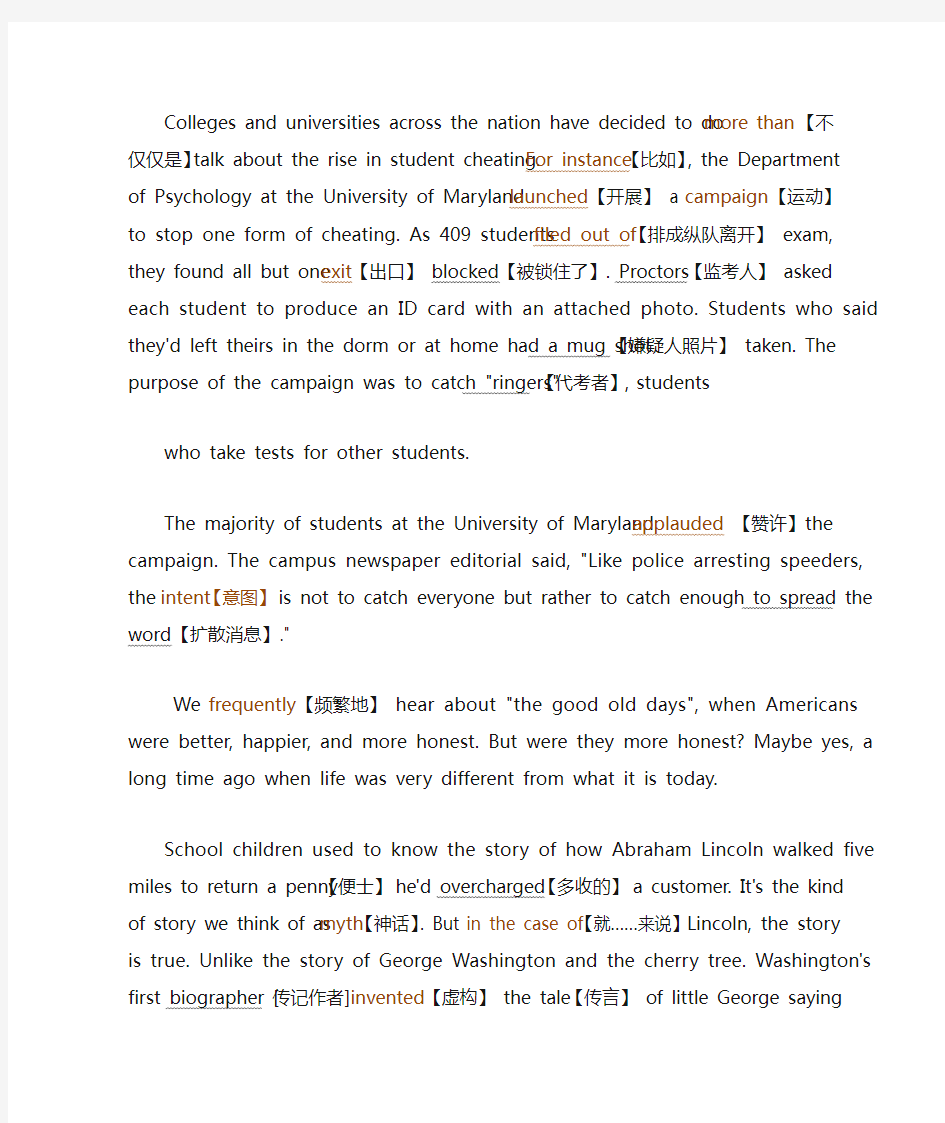

Ever thought about cheating on a test? Of course not. But some stud ents are not quite so honest …
Honesty: Is It Going Out of Style?
Atacia Robbins According to a recent poll【民意调查】, 61 percent of American high school students have admitted to cheating on exams at least once. It can be argued such a response may not mean much. After all, most students have been faced with the temptation【诱惑】to peek【偷看】at a neighbor's test paper. And students can be hard on themselves in judging such behavior. However, there are other indications【迹象】that high school cheating may be on the rise.
More and more states are requiring students to pass competency 【能力】tests in order to receive their high school diplomas【证书】. And many educators fear that an increase in the use of state exams will lead to a corresponding【相应的】rise in cheating. A case【例子】in point is students in New York State who faced criminal【犯罪的】misdemeanor【不法行为】charges for possess ing【拥有】and selling advance copies【复制品】of state Regents examinations【州摄政考试】.
Cheating is considered to be【被看做是】a major problem in colleges and universities. Several professors say they've dropped the traditional
好的】term papers【试卷】, and they can't track down【追踪,调查】all the cheaters【作弊者】anymore.
Colleges and universities across the nation have decided to do more than【不仅仅是】talk about the rise in student cheating. For instance 【比如】, the Department of Psychology at the University of Maryland launched【开展】a campaign【运动】to stop one form of cheating. As 409 students filed out of【排成纵队离开】exam, they found all but one exit【出口】blocked【被锁住了】. Proctors【监考人】asked each student to produce an ID card with an attached photo. Students who said they'd left theirs in the dorm or at home had a mug shot【嫌疑人照片】taken. The purpose of the campaign was to catch "ringers"【代考者】,students who take tests for other students.
The majority of students at the University of Maryland applauded 【赞许】the campaign. The campus newspaper editorial said, "Like police arresting speeders, the intent【意图】is not to catch everyone but rather to catch enough to spread the word【扩散消息】."
We frequently【频繁地】hear about "the good old days", when Americans were better, happier, and more honest. But were they more honest? Maybe yes, a long time ago when life was very different from what it is today.
School children used to know the story of how Abraham Lincoln
walked five miles to return a penny【便士】he'd overcharged【多收的】a customer. It's the kind of story we think of as myth【神话】. But in the case of 【就……来说】Lincoln, the story is true. Unlike the story of George Washington and the cherry tree. Washington's first biographer [传记作者]invented【虚构】the tale【传言】of little George saying to his father, "I cannot tell a lie. I did it with my ax【斧头】." What is important in both stories, however, is that honesty was seen as【被视为】an important part of the American character【精神】.
And these are just two stories out of many. Students in the last century usually didn't read "fun" stories. They read stories that taught moral【道德】value . Such stories pointed out quite clearly that children who lied, cheated, or stole came to bad ends【没有好下场】.
Parents may have further【更进一步地】reinforced【加强】those values. It's difficult to know. We do know that children didn't hear their parents talk of cheating the government on income taxes - there weren't any.【cheat sb. on sth.】
A clue【线索,证据】as to why Americans may have been more honest in the past lies in【在于】the Abe Lincoln story. Lincoln knew his customer. They both lived in a small town. Would a check-out person【收银员】at a large supermarket return money to a customer? It's less likely. On the other hand, would overnight guests at an inn【小旅馆】run【经营,run的过去式】by a husband and wife, steal towels【毛巾】? It's less
的】be at their honest best.
The vast【大量的】majority of Americans still believe that honesty as an important part of the American Character. For that reason, there are numerous【许多】watch-dog【监视器】committees【委员会】at all levels of society【在社会的各个阶层】. Although signs of dishonesty in school, business, and government seem much more numerous in recent years than in the past, could it be that we are getting better at revealing 【揭发】such dishonesty?
There is some evidence that dishonesty may ebb【退去】and flow 【流走】. When times are hard, incidents of theft and cheating usually go up. And when times get better such incidents tend to go down.
Cheating in school also tends to ebb and flow. But it doesn't seem linked to the economy.
Many educators feel that as students gain confidence in themselves and their abilities, they are less likely to cheat. Surprisingly, some efforts to prevent cheating may actually encourage cheating - a person may feel "they don't trust me anyway," and be tempted to "beat the system."
Distrust can be contagious【有传染性的】. But, so can trust!
Unit8 Honesty: Is It Going out of Style?
曾想到过在考试中作弊吗?当然没有。可是有些学生并不那么诚实……
诚实:难道它正在变得不合时宜?
斯泰茜娅·罗宾斯
根据最近的一次民意测验,百分之六十一的美国学生承认曾在考试中至少作过一次弊。人们可以争论说,这样一种回答也许没有多大意义。毕竟大多数学生都曾受到过偷看邻座考卷的诱惑。而学生们在评价这类行为时有时对自己过于严格。不过,还有别的一些迹象也表明,中学里的作弊现象可能是在上升。
越来越多的州要求学生通过能力测试以取得中学毕业文凭。很多教育学家担心,更多地利用州级考试将会导致作弊的相应增加。一个明显的例子就是纽约州的一些学生,他们因拥有并出售州教育董事会的考卷样本而受到刑事轻罪指控。
现在作弊也被看作是大学的一大问题了。一些教授说他们已经放弃了传统的学期论文这一要求,因为很多学生购买预先写好的各种学期论文,教授们再也查不出所有的作弊者了。
除了谈论学生作弊的上升外,全国各地的大学已决定采取一切措施。例如,马里兰大学心理系就开展了一场制止某种作弊形式的运
动。当409名学生考完试鱼贯离开教室时,他们发现除了一个出口外,所有的出口都堵住了。监考人员要求每个学生出示贴有照片的身份证。那些说把身份证留在宿舍或家中的学生都被拍了面部照。这一运动的目的是捉拿“冒名顶替者”,即帮别人代考的学生。
马里兰大学的大多数学生都鼓掌欢迎这一运动。校刊社论说:“就像警察逮捕违法超速驾车者一样,这一运动的目的并不是要捉拿所有的人,而是抓住足够的作弊者以便把信息传开去。”
我们经常听人谈起“美好的往日”,说是那时的美国人比现在好,比现在幸福,也比现在诚实。但他们真的较诚实吗?也许在很久以前,他们确实更诚实,因为那时的生活跟今天的生活大不相同。
中、小学学生过去都知道亚伯拉罕·林肯步行五英里把多收的一分钱还给顾客的故事。我们已经把这类故事看成了神话。但就林肯来说,这故事却是真实的……而不像乔治·华盛顿和樱桃树的故事那样是杜撰的。华盛顿的第一位传记作者虚构了小乔治对父亲说“我不能说谎,我用斧子砍倒了樱桃树”的故事。然而,在两个故事中都很重要的一点是,诚实过去一向被看作是美国人性格中的一个重要组成部分。
而且这仅仅是许许多多故事中的两个故事。上个世纪的学生一般都不读“娱乐性的”故事。他们读的都是些传授道德标准的故事。这类故事非常明确地指出,说谎、骗人、偷东西的孩子决没有好下场。
做父母的很可能进一步加强了这些道德标准。是不是真的如此就很难知道了。但我们的确知道,过去的孩子听不到父母谈论在所得
税上欺骗政府的事——那时候还没有所得税。
林肯的故事中提供了一个线索,说明为什么过去的美国人也许是比较诚实的。这就是林肯认识他的顾客,他们都住在同一个小镇上。一家大的超级市场的结账员会把多收的钱还给顾客吗?可能性较小。反之,在一家夫妻经营的小旅馆过夜的客人会偷毛巾吗?可能性也不大。
也许这就告诉我们,人们需要互相了解才能达到最诚实的境界。
绝大多数美国人仍然认为诚实是美国人性格的一个重要组成部分。因此,在社会各级都有许多监督委员会。虽然学校、商界和政府中的作弊和欺诈行为近年来似乎比过去多了许多,但这会不会是由于我们越来越善于揭露这类不诚实行为的缘故呢?
有某些证据表明,欺诈行为可消可长,有起有伏。当时世艰难时,偷窃和欺骗事件通常便会增多。当形势好转时,这类事件往往就会减少。
学校中的作弊现象也往往有涨有落。但它似乎跟经济没有什么联系。
许多教育学家认为,当学生对自己和自己的能力有了信心以后,他们就不大可能作弊了。令人惊奇的是,某些防止作弊的努力可能反而促使学生作弊——一个人可能会感到“他们反正不信任我”,于是便很想“击败这个制度”。不信任可以有传染性。但是,信任也可以有传染性。
WORDS
Admit vt.& vi. 许可进入;承认,供认vt. 允许;确认vi. 承认;允许【过去式:admitted 过去分词:admitted 现在分词:admitting 名词形式:admission】
e.g. It will not be suicide to admit your mistake. 承认你的错误并不等于自毁前程。
e.g.She was admitted to hospital with a soaring temperature... 她因发高烧被送进医院。
e.g. Almost all of us were admitted to college last year.去年,我们基本上都被大学录取了。
Admission英[?d?mi??n] 美[?d?m???n]
n. 准许进入;承认;坦白;入场费
e.g. Gates open at 10.30am and admission is free. 早上10:30开门,免费入场。
e.g. She wanted some admission of guilt from her father. 她期待她父亲能够认罪。
Respond vt. & vi. 回答,响应vi. 作出反应,响应;回报或回复n. [建](柱,拱基等的)对称,壁联
e.g. You should deliberate over the question before you respond to it. 回答问题之前你应该慎重考虑。
E.g. He was noticeably slow to respond. 他明显反应迟缓。
After all毕竟;究竟;归根结底;(解释或说明理由)别忘了
e.g. Stop pulling him about like that; he's a child after all. 别那样折腾他了,他毕竟还是个孩子。
e.g. After all, tomorrow is another day.毕竟明天又是新的一天。
T emptation n. 诱惑,引诱;诱惑物
e.g. The temptation warred with his conscience. 这种诱惑与他的良心作斗争。【conscience 英[?k?n??ns] 美[?kɑn??ns]】
tempt vt. 引诱,怂恿;吸引;冒…的风险;使感兴趣vi. 有吸引力Nothing could tempt him to such a course of action. 什么都不能诱使他去那样做。
peek vi. 偷看,窥视;眯着眼睛看n. 偷看,窥视;一瞥,看一眼e.g. I took a peek at the list. 我偷看了一眼名单
e.g.Anyone who dared to peek was condemned to death. 任何敢偷看的人被定死罪。
judge 英[d??d?] 美[d??d?]
vt.& vi. 审判,评判;断定vt. 估计;评价;(尤指)批评;想,认为n. 法官;裁判员;评判员;鉴定人
e.g. It's for other people to judge how much I have improved.我有多大的进步应该由其他人来评价。
e.g. Judging by the opinion polls, he seems to be succeeding... 从民意测验来看,他似乎胜券在握。
e.g.People are liable to judge others from their own first impressions. 人们容易用他们自己的最初印象来评价别人。
Indication n. 指示;象征;表明;标示
e.g. He gave no indication that he was ready to compromise. 他没有妥协的意思。
Competency 英[?k?mpit(?)nsi] 美[?kɑmp?t?nse]
n. 资格,能力,作证能力【adj. 有能力的,能胜任的,能干的】e.g. Drilling down into a candidate's competency was part of interview technique. 彻查应聘者的能力也是面试技巧的一部分。
In order to 为了
e.g. We have fought scores of battles in order to win victory. 为赢得胜利,我们进行了数十次战斗。
Corresponding 英[?k?ris?p?ndi?] 美[?k?r??spɑnd??, ?kɑr-]
adj. 相当的,对应的;通信的;符合的,符合。。;一致的v. 相符合( correspond的现在分词);类似(correspond的ing形式);相配
All rights carry with them corresponding responsibilities. 一切权利都带有与之相应的责任。
Correspond 英[?k?ris?p?nd] 美[?k?r??spɑnd, ?kɑr-]
vi. 符合,一致;相应;通信
e.g. She still corresponds with American friends she met in Majorca nine years ago... 她仍与9年前在马略卡岛结识的美国朋友们通信。
e.g. We corresponded regularly. 我们定期通信。
e.g. The translation does not quite correspond to the original. 译文不切原意。
Criminal n. 罪犯,犯人adj. 刑事的;犯罪的;可耻的【n. crime】e.g. He has many years' experience of the criminal mentality. 他研究犯罪心理有多年经验。
e.g. The criminal was adjudged to prison for eight years. 该犯被判刑八年。
Misdemeanor n. 不法行为;(相对于重罪的)轻罪,小罪
e.g. Why little ate has also become the misdemeanor? 为什么少吃一顿也成了坏事呢?
Possess vt. 拥有;掌握,懂得;主宰;缠住,迷住
Possession n. 有,所有,拥有;领地;财产,所有权,占有物,所有物;持有违禁物
In possession of拥有
In the possession of在……名下,被拥有
e.g. He is now in possession of the company.
e.g. The company is now in the possession of him.
Track down 追捕到,追查出;追寻;查获
e.g. They hope to track down the source of the infection. 他们希望查出这种传染病的根源。
For instance = for example
Launch英[l?:nt?] 美[l?nt?, lɑnt?]
vt. 发射;[计算机]开始(应用程序);发动;开展(活动、计划等)vi. 投入;着手进行;热衷于n. 投掷;大船上的小艇;大型敞篷摩托艇
e.g. We're going to launch a big recruitment drive in the autumn. 我们将在秋季进行大规模征兵。
e.g. I saw the launch of the rocket yesterday. 我昨天看了火箭发射。File out of 鱼贯而出
e.g. The jury filed out of the courtroom.
陪审员们从法庭里鱼贯而出。
File 英[fail] 美[fa?l]
vt. 提出(离婚诉讼或其他讼案);把…归档;用锉锉;发稿,寄给报社vi. 发送(报道给报社);排成一行行走;提出申请n. 文件夹;卷宗;纵列;锉刀;伸进并神经病伸进并
Applaud 英[??pl?:d] 美[??pl?d]
vt. 鼓掌欢迎,欢呼;称赞,赞许;赞成,同意vi. 夸赞,鼓掌
e.g. Every person stood to applaud his unforgettable act of courage. 所有人起立为他不可磨灭的英勇之举鼓掌。
Intent n. 意图,目的;意思,含义adj. 专心的,专注的;意愿坚决的;急切的;一心想…的
e.g. His plan is incompatible with my intent. 他的计划与我的意图不相符。
e.g. Rodney had been intent on every word. 罗德尼字字留心。Frequently adv. 频繁地,屡次地;往往;动;动辄
Frequent 英[?fri:kw?nt] 美[?frikw?nt]
adj. 频繁的,时常发生的,常见的;(脉搏等)急促的,快的
[fri?kwent]
vt. 常到,光顾,常与…交往;常去,时常出入于
e.g. It is not polite to interrupt a speaker with frequent questions. 不断提问打断演讲者是不礼貌的。
Penny n. 便士;(美国、加拿大的)一分钱;少量的钱
复数:pennies pence
Myth 英[miθ] 美[m?θ]
n. 神话;神怪故事;奇人,奇事;虚构的人,虚构的事v. 使神话化复数:myths
Invent vt. 发明,创造;虚构
e.g. He invented the first electric clock... 他发明了第一个电动机械钟。
Character n. 性格,品质;特征;[计] 字符;人物,角色vt. 刻,印;使具有特征
Moral 英[?m?:r?l] 美[?m?r?l, ?mɑr-]
adj. 道德的,道义上的;精神上的;无疑的,当然的;教导道德的n. 寓意,教训;(尤指男女间的)品行;格言;〈古〉相对者
Value n. 价值,价格;意义,涵义;重要性;(邮票的)面值vt. 评价;重视,看重;估价,给…定价(形容词形式:valuable)
Moral value 道德观,价值观
Reinforce 英[?ri:?n?f?:s] 美[?ri?n?f?rs, -?fors]
vt. 加固;使更结实;加强;充实vi. 求援;得到增援;给予更多的
支持n. 加强;加固物;加固材料
e.g. Your positive response will reinforce her actions. 你积极的回应会使她的行为更加坚定。
Clue英[klu:] 美[klu]
n. 线索;提示;(帮助警方破案的)线索;(纵横填字谜、游戏或问题的)提示词语vt. <非正>为…提供最新情况(消息等)
e.g. The clue could not be followed up. 案子的线儿断了。
Vast adj. 广阔的;巨大的;大量的;巨额的n. 浩瀚;广大无边的空间
Majority英[m??d??riti] 美[m??d??r?ti, -?d?ɑr-]
n. 多数;(获胜的)票数;成年;法定年龄
e.g. A majority vote enabled the passage of the resolution. 多数人投赞成票使议案得以通过。
e.g. . The majority of people in the province are in favour of devolution. 该省大多数人赞成权力下放。
【注意观察两个句子,找出a majority和the majority 的区别】Numerous 英[?nju:m?r?s] 美[?num?r?s, ?nju-]
adj. 很多的,许多的;数量庞大的数量庞大的;数不清的
reveal 英[ri?vi:l] 美[r??vil]
vt. 显露;揭露;泄露;[神]启示n. 揭示,展现;[建]门侧,窗侧e.g. She has refused to reveal the whereabouts of her daughter. 她不肯透露她女儿的行踪。
Ebb英[eb] 美[?b]
vi. (指潮水)退;跌落;减少;衰落n. 退潮;落潮;衰退;减少contagious 英[k?n?teid??s] 美[k?n?ted??s]
adj. 有传染性的;传染病的;有感染力的;会蔓延的
e.g. It's a highly contagious infection. 这种病极易传染。
e.g. He's got a contagious laugh. 他的笑富有感染力。
Arrest 英[??rest] 美[??r?st]
vt. 逮捕,拘捕;止住,阻止,抑制;吸引(注意)vi. 心跳停止n. 拘留;停止,阻止;制动(装置)
e.g. As he reached the hall after her, he saw what had arrested her. 他跟随她到了大厅,看见了吸引她注意的东西。
e.g. The police say seven people were arrested for minor offences. 警方称有7人因轻罪被捕。
【棕色粗体为基本必备词汇,so ,老实背吧^_^】